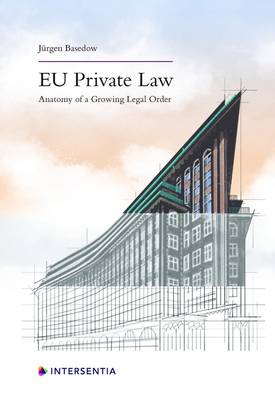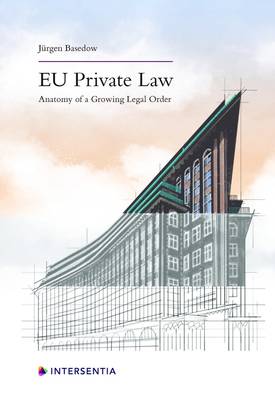
- Afhalen na 1 uur in een winkel met voorraad
- Gratis thuislevering in België vanaf € 30
- Ruim aanbod met 7 miljoen producten
- Afhalen na 1 uur in een winkel met voorraad
- Gratis thuislevering in België vanaf € 30
- Ruim aanbod met 7 miljoen producten
Omschrijving
"Professor Basedow offers an original and thought-provoking account of the emerging principles of EU private law. The EU has intervened in specific, typically detailed ways across a range of topics within private law. But this does not create a distinct EU-level private law. Instead by systematic, thorough and original analysis, Basedow shows how coherent themes and principles shape the specific contributions of the EU to Member State private laws. These values are not only market-based, but social and ethical. He is forthright in criticising lack of clarity and incoherence where he finds it. But he also offers a sense of direction for how the EU should undertake its interventions in private law. The work shows a breadth of knowledge of Member State laws as well as of the range of EU legislation, case law and soft law, presented in a clear and succinct manner. EU Private Law is a landmark work which will be a reference point for EU lawyers and national lawyers alike."
-- John Bell, Emeritus Professor of Law, University of Cambridge, 2021
Professor Jürgen Basedow is one of a very few scholars who are able to not only identify new phenomena in legal science, but also make concrete proposals and offer an appropriate legal framework that would meet the needs of contemporary challenges. His interdisciplinary approach is such that his new book should be of particular significance for lawyers specialising in EU law or in private law, no matter whether they are academics or legal practitioners.'
-- Maciej Szpunar, First Advocate General, 2021
______ EU law covers numerous sectors of private law and is still expanding. Due to its fragmentary nature, most legal literature addresses specific areas such as EU labour law, EU company law, EU private international law, EU consumer law, etc. In contrast, this book presents an innovative approach in its analysis of EU private law, considering its continuous expansion as an ongoing process and interrogating some central questions: What is private law in the framework of the EU? How does EU private law relate to traditional concepts of private law? What is the impact on horizontal relations of the law of the Union which was established with a view to the integration of peoples in Europe? Is the frequent reference to the policy orientation of EU law sufficient to overcome the differences between public and private law? Like the growth rings of a tree the numerous acts and judgments of EU private law feed from the trunk and the roots, which developed in the vertical relations between the Union and the Member States. The foundations of EU law, which often have a background in legal history, comparative experience and public international law, impact upon horizontal relations in a manner previously unknown in national systems of private law.
Across ten parts grouped in four books devoted to foundations, principles, enforcement and implementation, respectively, as well as the external dimension, the author elaborates on the peculiarities of EU private law as compared to the traditional analysis of private law in any given national legal system. The author traces throughout the book the origins of legal principles and rules in comparative law, legal history and public international law and their application and development in EU private law instruments and the judgments of the CJEU. This comparison helps to strengthen our understanding of those peculiarities and paves the way for a comprehensive critical assessment of the state of EU private law today. __ JÜRGEN BASEDOW is Director Emeritus at the Max Planck Institute for Comparative and International Private Law and Professor of Law at the University of Hamburg.
Specificaties
Betrokkenen
- Auteur(s):
- Uitgeverij:
Inhoud
- Aantal bladzijden:
- 788
- Taal:
- Engels
Eigenschappen
- Productcode (EAN):
- 9781839701214
- Verschijningsdatum:
- 19/05/2021
- Uitvoering:
- Hardcover
- Formaat:
- Genaaid
- Afmetingen:
- 160 mm x 240 mm
- Gewicht:
- 1510 g

Alleen bij Standaard Boekhandel
Beoordelingen
We publiceren alleen reviews die voldoen aan de voorwaarden voor reviews. Bekijk onze voorwaarden voor reviews.











